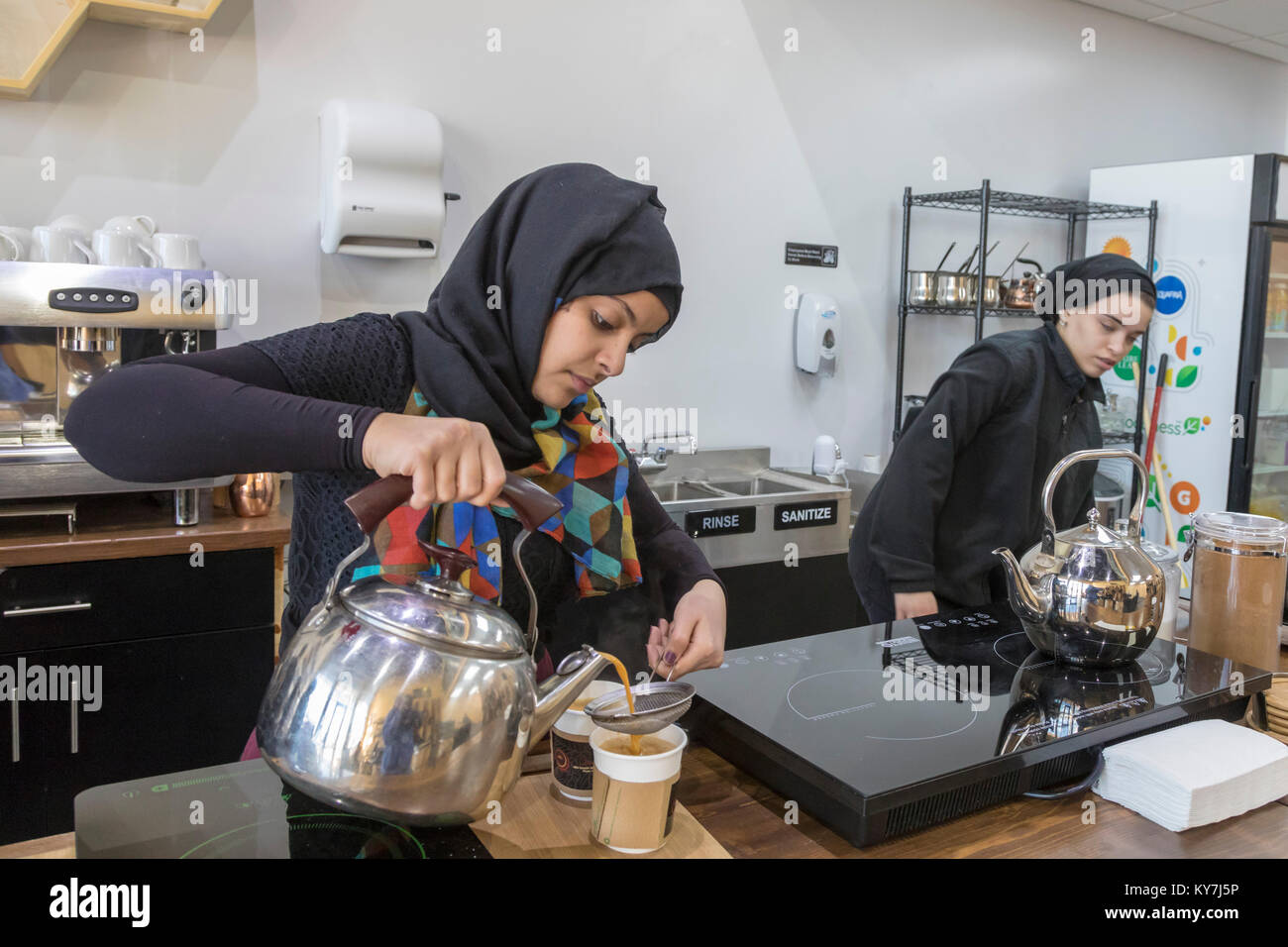Table Of Content

Whether you’re looking for a quick caffeine fix on-the-go or seeking a relaxing spot to unwind with friends, Qahwah House offers a welcoming atmosphere that caters to every individual need. Here at the coffee shop, I use the same recipes my ancestors and family used to prepare the traditional Yemeni drinks. We use spices such as cardamom, ginger, and cinnamon in many of our drinks. People from all over Michigan and the United States come to enjoy our coffee, and many comment that it’s like nothing they’ve ever tried before. Aleyna Ciftci, 24, of Wayne said she used to travel to Brooklyn to visit another franchise location that became a popular hangout for young Muslims. She enjoys talking with friends, playing cards and drinking chai there, she said.
This Clifton Yemeni coffee shop brews flavor, culture and history - NorthJersey.com
This Clifton Yemeni coffee shop brews flavor, culture and history.
Posted: Mon, 12 Dec 2022 08:00:00 GMT [source]
Social Menu
He says they are the reason so many more people have started to learn about Yemen. The staff are his friends, one is his brother, and they get his tea ready as soon as he walks in the door. "There are no Arabs or Muslims in this area," Alhasbani told MEE.
The Legendary Buddy Prine Russell: A Trailblazing Country Icon
Broadway in Downtown Los Angeles has undergone a tidal wave of changes in the past decade-plus. “You’re competing with people’s memories,” Meieran tells the Times. A pour over is a handcrafted style of brewing coffee which requires a slow rhythmic process. After the first drops of water are absorbed in the beans, they must fluff up or “bloom” before more water is poured on top. This way of making coffee helps to maximize flavor and quality for the coffee drinker.
Location & Hours
Here, you’ll also meet Ibrahim Alhasbani—the founder, owner, roaster, and barista behind Qahwah House, which means “coffee” in Arabic. While people waited for their orders, many would stand and admire a giant map that traced the roots of Yemeni coffee and how it was distributed to the rest of the world. One of Alhasbani's reasons for launching Qahwah House was to build bridges between cultures. It's one of the main reasons why the New York City location is in Brooklyn's Williamsburg, a majority white, Jewish neighbourhood, he says. And for many of the young Muslims and Arabs in New York, Qahwah House serves as a place of community - a place where they can get a taste of the place many of them yearn to be in.

Menus People Viewed Nearby
Waell also says Qahwah House has an unparalleled social atmosphere and welcoming environment. “You got one person sitting [at] a table alone and then by the end of the time he leaves, he has 20 people sitting with him,” he says. For practising Muslims who do not go to clubs or bars, there are few places to hang out other than restaurants. Qahwah House provides an alternative community space for people to socialise. Waell Ali, a co-owner of the Clifton location, said he learned about the heritage of Yemen, his family’s country of origin, when he started working at Qahwah House. Now known as Clifton’s Republic, the multi-story property at 648 S.
A neat feature to Yemeni coffee is that the beans are naturally sweet, and sometimes they consist of fruity notes like mango. The pride for his family, home country, and the history of the Yemeni coffee bean all fuel Alhasbani’s passion for running a café. Add to that the belief that Yemen is the origin of the first coffee plant in the world, and you have a story rife with symbolism. It is said that coffee originated from Yemen’s Port of Mokha in the 14th century, and for nearly 200 years after that, Yemen remained the sole distributor of coffee.
It also has a natural chocolate flavor that other places have tried to emulate by adding chocolate to coffee and calling it mocha. Coffee always had a social quality to it, Um said, adding that coffeehouses could be found in major cities like Cairo, Istanbul and Damascus by the mid 1500s. The drink also had detractors, who thought it could inspire radical ideas or seditiousness because of its social character, she said. Around the 15th century, Sufi monks were known to make coffee to stay awake during mediation and prayers. As it grew in popularity, the lucrative crop was shipped across the Middle East and Europe from the Red Sea port.
The Untold Story of Camilla’s First Husband
Waell Ali, co-owner of the newest Clifton branch in New Jersey, lives in New York and has been friends with Ibrahim since before the founding of Qahwah House. Waell started getting involved when the Brooklyn branch opened around three years ago. He described the coffee as having natural sweetness and a fruity, not bitter, aftertaste.
With this situation in Yemen it’s hard to bring coffee beans to the U.S.A. It’s a challenge, but you have to take a risk. The coffee there is grown organically in higheraltitudes and prepared using natural methods. A Yemeni immigrant, Ibrahim has been roasting and brewing coffee in Dearborn for two years. But not just any coffee—he imports all his beans directly from his own family farm that he grew up on in Yemen.
Ibrahim’s goal was to create a space that was welcoming for everyone, and not just one type of customer, though many customers are Muslim or Arab (or both). Originally, we are from Yemen where we were born and raised amidst coffee plants.Our expertise originates from a long line of ancestors, all committed to the tradition and innovation of coffee. From this inherited practice, we know what it means to love coffee. Qahwah House is in the process of planning its grand opening for sometime in late October.
At the Qahwah House — "qahwah" means "coffee" in Arabic — a massive map adorns a wall depicting historic trade routes of Arabica beans from Yemen to the rest of the world. In the 15th century, Yemen became the first place to cultivate and drink coffee beverages, and then exported the crop around the world. In addition to coffee and tea, Qahwah House also offers cakes and pastries from Zingerman’s Bakehouse in Ann Arbor. In addition to the coffee beans that Alhasbani roasts and grinds in-house, he also offers tea and some food items.

Just as his coffee beans must make the journey from Yemen to the United States, so did Ibrahim Alhasbani. And although there are challenges in both journeys, the result is worth it. The passion and connection behind each cup of coffee served at Qahwah House go beyond what many baristas can offer.
The Clifton café, which opened Nov. 6, is in a location that straddles the border with Paterson in an area that is home to many Middle Eastern restaurants, bakeries and grocery stories. "Anything that comes from the place of origin is always the best." It’s a history that franchise founder Ibrahim Alhasbani is eager to share.
I thought the tea was the best thing I ever had but then I tried the coffee and was truly blown away. I will definitely be back to try more of the items they have to offer. The best quality coffee with no added preservatives, artificial additives, or flavors.
Pair it with their delectable pastries for a delightful treat. “When we open more locations, we create more opportunities for jobs here and also back in Yemen,” he says. Qahwah House sources its coffee beans directly from Yemen, which creates opportunities for coffee farmers. Qahwah House’s sourcing of coffee beans directly from Yemen is part of their effort to educate people on this history and parts of Yemeni culture to be proud of. At the Clifton Qahwah House, the beans are ground and served in light and medium roasts used in aromatic cups of coffee, or in coffee drinks like lattes, cappuccinos and espressos. Customers can also indulge in pastries such as sabaya, a flaky layered bread cake popular in Yemen.
DEARBORN—A cup of Joe is readily available at almost every intersection in the metropolitan area, especially Dearborn, where coffee shops, diners, hookah bars and gas stations all boast a bold and strong coffee. "This space reminds young Muslims, young Arabs of our culture," Alhasbani said. "It reminds us where we come from, so they will not forget their culture and their history, and they will work to improve on this history." Noorehden says one of his favourite parts about working at Qahwah House, especially when he worked the morning shift, was the fresh smell of the coffee beans, which are roasted and brewed in-house after arriving from Yemen.

No comments:
Post a Comment